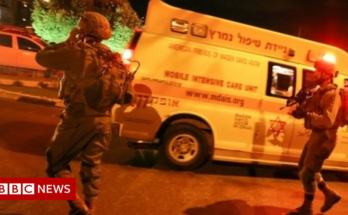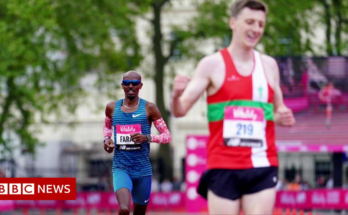It is Sylvie Jean Baptiste’s job to check on patients during the 15-minute wait that follows their Covid-19 vaccinations.
“I am there for them if they need support,” said Ms. Baptiste, a nursing graduate student and employee at Mount Sinai Brooklyn in Midwood. “I offer them a snack, maybe water or juice. If they seem nervous I start conversations with them.”
The hospital typically vaccinates hundreds of people a day, depending on supply, so Ms. Baptiste cannot focus on one person for too long. But Mira Rosenblatt, an older woman wearing a raspberry beret and pushing a bright blue walker, got her attention.
“She said, ‘I am not nervous. I’ve been through way worse,’” Ms. Baptiste recalled. “Then she started telling her story.”
Ms. Rosenblatt, 97, is the mother of four (although only two are still alive, daughters ages 66 and 69). She has eight grandchildren and four great-grandchildren. Since 1968, she has lived in the same apartment in Midwood along Ocean Parkway, where she has also claimed a bench outside. She spends hours a day there, even in the winter, people-watching.
She is also a Holocaust survivor.
Mira Rosenblatt was born a Jew in Sosnowiec, a city in southern Poland. In 1939, she was 15 years old when her family was forced into a ghetto. In 1942, she was taken from her family and sent to a labor camp. In early 1945, while on a midwinter death march, when Nazis made inmates walk long distances with no rest, water, food or coats, she escaped the group and hid in a forest.
She stayed alive there by eating worms and other creatures, digging into the frozen ground to find them, and sleeping in holes underneath snow for warmth. After several days of this, Mira found refuge on a farm, but she was scared of being turned in and went back to the wilderness. Days later, she successfully blended in with a group of dairy farmers by hiding her Jewish identity. Mira worked with them until the war ended, some six months later.
In 1945 as a 21-year-old, she was reunited with a former suitor from Poland named Henry Rosenblatt, who had survived Auschwitz. They immigrated to America and were happily married until he died in 2017.
“She started telling me her story when I was 10,” said Belinda Levavi, Ms. Rosenblatt’s younger daughter, who lives in Brooklyn. “My mother believes because she lived, she has a responsibility to tell as many people as possible.”
Until recently, Ms. Rosenblatt spoke at high schools and colleges about her experience. She moved audiences so much that some of the students became her friends, visiting a few times a month on Ocean Parkway.
March 5, 2021, 7:20 p.m. ET
The pandemic put an end to her in-person guest appearances and social visits. “I can tell that Covid has had its effect,” Ms. Levavi said. “A prolonged absence of activity and people have taken a toll.”
Both mother and daughter did use the down time in a productive way, self-publishing Ms. Rosenblatt’s story, “Strength: My Memoir,” on Amazon last fall. They tried to hire a ghost writer but ended up writing it themselves. “It had to be in her own voice,” Ms. Levavi said. “My mother didn’t want it any other way.”
On Feb. 2, Ms. Rosenblatt got to socialize with strangers indoors for the first time in over a year when she went for her second vaccine appointment. The first time slot had been tense and chaotic, she said, so she had kept to herself.
What You Need to Know About the Vaccine Rollout
But the day of her second appointment was chaotic for a different reason. By early morning, New York City had been pounded by over 17 inches of snow, more than all of last winter combined. Ms. Rosenblatt, however, wanted that shot. The sidewalks had not been shoveled yet in her neighborhood, so she climbed over a four-foot-tall snowbank to get into the car of her granddaughter-in-law, who was picking her up. Outside of the hospital, she waded through a pool of water that went up to her ankle.
Inside, however, the hospital was calm. Unlike Ms. Rosenblatt, some New Yorkers had been daunted by the weather, canceling their appointments.
“It wasn’t busy, but it was a good steady flow,” said Kristine Ortiz, the nurse overseeing the vaccine operation who noticed Ms. Rosenblatt, with her bright purple striped shirt and sad but alert eyes, as soon as she walked in through the door. “She had a presence about her,” she said. “Sometimes with elderly people you have to be mindful about their mental side, but she was sharp.”
Seeing the potential for communion, Ms. Rosenblatt told her story to three nurses that day, including Ms. Ortiz.
“When you have someone who has survived something like this, you can’t help but stand still,” said Ms. Ortiz, who ended up buying Ms. Rosenblatt’s book and stopping by her apartment later that week for her to sign it. “There were definitely tears. I had to ask someone to take over for me for a few minutes afterward because I felt shaky from the story.”
Ms. Rosenblatt’s tale provided a much-needed perspective, said Ms. Baptiste, the nursing graduate. “It made me feel like the mind is truly an amazing thing, and if you believe you can get through something you will,” she said.
While many New Yorkers decades younger than Ms. Rosenblatt choose to rest and ice their arms immediately after their jabs, Ms. Rosenblatt had a same-day speaking appointment she couldn’t miss: a Zoom event organized by the American Society for Yad Vashem, Israel’s official Holocaust memorial center. She told her story for over an hour.
More than 250 people were on the call, including Ms. Baptiste, who took a break in her studies to tune in to the event. “It would be hard to tell if she had side effects from the Zoom,” she said. “I did feel a little like I was watching a celebrity. I was like, ‘I met her.’”



